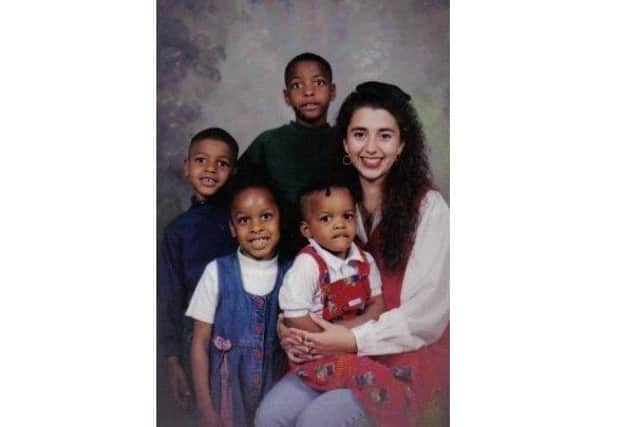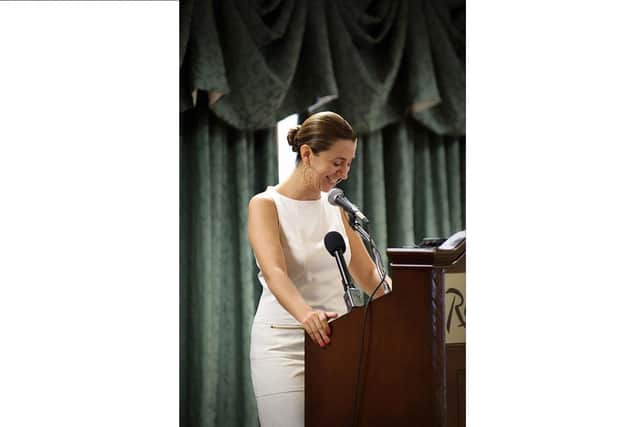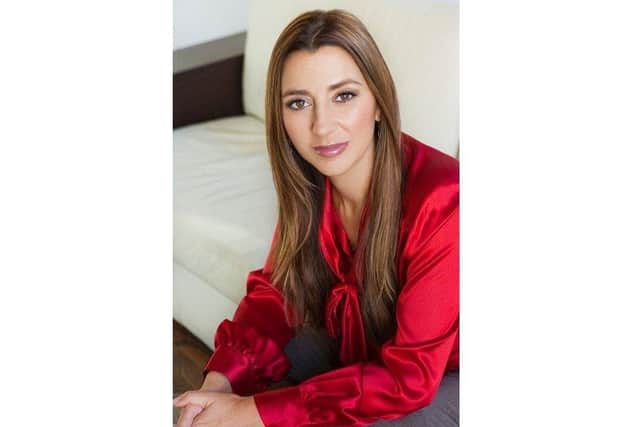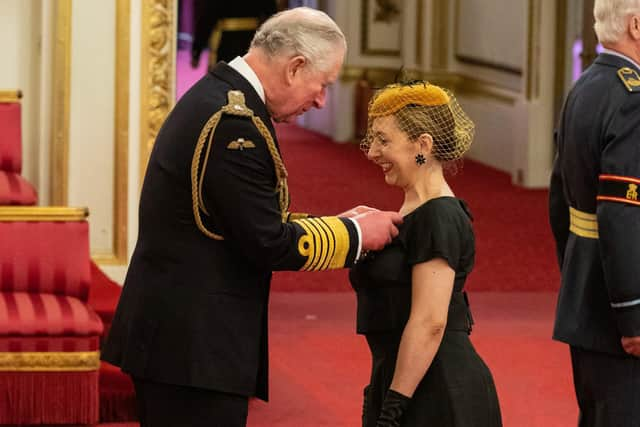Sex trafficking survivor from Portsmouth honoured for her fight against sexual exploitation


Rachel Lloyd was made a Companion of the Order of St Michael and St George by Prince Charles on Thursday, an award given to British people who have undertaken extraordinary, important services abroad.
Sex trafficking survivor Rachel, 44, told The News about her extraordinary life, from growing up with her single mum in Pelham Road, Southsea, before being trafficked into a life in the sex industry on the continent at the age of 17.
Advertisement
Hide AdAdvertisement
Hide AdDespite being told she would only have to speak to customers in her job behind the bar of a strip club in Germany, she was soon shown a back room where clients had other expectations.


For two years she was put to work by a violent pimp who exploited her for money before she could escape.
Now running a successful organisation helping trafficking victims in America, she hopes her story will show others that there is life after exploitation.
‘If I think about myself at 13, living on Pelham Road, I didn’t see that life would get better,’ Rachel told The News.


Advertisement
Hide AdAdvertisement
Hide Ad‘I would hope that if anything comes out of this award it’s that people that identify themselves in the story and can feel some measure of hope and there’s a way out and a way forward.’
Bright and full of promise, Rachel was given a scholarship to Portsmouth High School, but experienced racism from adults and children in the city throughout her teenage years due to being part Roma.
‘I had a tough time because my mum was married for about three years and he was an alcoholic, then she became an alcoholic,’ Rachel said.
Dropping out of school at 13 to help get the family out of debt saw Rachel take on jobs in the Estee Lauder factory, at IBM and also at nightclubs which led Rachel to a completely different world.


Advertisement
Hide AdAdvertisement
Hide AdReflecting on working in former Portsmouth clubs Ritzy’s and 5th Avenue, Rachel said: ‘Once you’re out of school and working in a nightclub, drinking and meeting guys then you don’t want to go back to school.
‘When you're living as an adult and don’t have parental involvement it’s really easy to get caught up in a lot of stuff so I started doing drugs.’
When Rachel was 17, she met some girls in a pub who were talking about their lives working in Germany, a seemingly attractive prospect.
Rachel said: ‘I sold my Christmas presents and got on a bus four days after Christmas.
Advertisement
Hide AdAdvertisement
Hide Ad‘I was on the ferry when they told me it was really hard and they don’t have jobs.’
Looking for work in a country where she did not speak the language and did not have money to return home, Rachel began working behind the bar in a strip club when she was trafficked and exploited from the back-room business.
‘It was super traumatising and I came out really upset,’ Rachel said.
‘I wanted to make the money to get back home. I ended up meeting a guy who became my pimp, I thought he was a regular boyfriend.
‘Things got progressively worse from there.’
Advertisement
Hide AdAdvertisement
Hide AdAfter a violent and turbulent time with her crack-addicted pimp, he left the country and at age 19 Rachel met a woman from an American Methodist church, which allowed her to find a path to escape exploitation.
‘I ended up giving my life to God, it was really bumpy in the beginning,’ said Rachel.
‘I still had to get out of the life and find a job and find somewhere to live.’
Rachel worked as a nanny before moving to New York, working for an organisation helping women who had been exploited and trafficked.
Advertisement
Hide AdAdvertisement
Hide AdBased in New York, she has changed the lives of thousands of victims in her role as chief executive of Girls Educational and Mentoring Services, known as GEMS, which she started from her kitchen table.
The first couple of years saw Rachel host girls on her sofa, before getting some money for office space and staff.
Speaking about what made her keep going, Rachel said: ‘Despite a difference in continents, countries and cultures, everyone’s experiences sounded the same.
‘I was the first person they had met who had got out of the life successfully.
Advertisement
Hide AdAdvertisement
Hide Ad‘Either people got out and just never talked about it or, for a lot of women, they got older and just stayed in or they died.’
Rachel was blown away by the experience at Buckingham Palace, being recognised for her work as an activist, advocate and leader in the fight against commercial sexual exploitation of girls and young women.
The organisation has seen great success over the years, helping to change legislation in the US and bring trafficking issues to the forefront - and it’s down to Rachel’s determination to help others.
Shifting public perception about sex trafficking
GIRLS as young as 11 have used the services available through Girls Educational and Mentoring Services, which empowers commercially sexually exploited and domestically trafficked young women.
Advertisement
Hide AdAdvertisement
Hide AdFor the past 20 years, GEMS has been committed to shifting public perception and policy through cultural change, advocacy, training, and survivor leadership.
The organisation trains thousands of professionals every year on best practices for working with trafficking victims and survivors across the USA, as well as providing a drop-in centre and housing services.
Legislative change sparked by chief executive Rachel Lloyd’s work has included co-writing the Safe Harbor for Exploited Youth Act in 2008, which means young children arrested for prostitution will be presumed to be victims of sexual exploitation.
Rachel said: ‘We have made huge progress, we have really normalised the idea that survivors can be leaders and should be at the forefront of planning and policy of things that will affect people like them. I’m really proud of that work.’
Advertisement
Hide AdAdvertisement
Hide AdGEMS made a film in 2007 called Very Young Girls, which has been seen by more than five million people and has had a tremendous impact on people’s awareness of domestic trafficking.
Rachel said: ‘It would have been nice to have grown up differently but it would mean GEMS didn’t exist.
‘We have changed language, we have changed legislation, we have put survivors at the front and centre. I love the girls I work with, we’re family, we have created a community.’
For more information about the work of GEMS, visit gems-girls.org.
Human trafficking in this country
Advertisement
Hide AdAdvertisement
Hide AdMANY organisations are working to stop human trafficking and sexual exploitation, which is prevalent in the UK despite misconceptions that it only happens abroad.
Anti-Slavery International advises that most people are trafficked into the UK from overseas, but there is also a significant number of British nationals in slavery.
The Medaille Trust estimates that 40.3 million people are trapped in some form of modern slavery in the world today, with 136,000 of these estimated to be from the UK.
From January to March 2019, 2,156 potential victims were submitted to the National Referral Mechanism, a framework for identifying victims of human trafficking and ensuring they receive the appropriate protection and support.
Advertisement
Hide AdAdvertisement
Hide AdPeople are often trafficked into industries such as agriculture, construction, hospitality, manufacturing and car washes, however many women are trafficked for sexual exploitation.
Most victims of sex trafficking are ‘recruited’ in person, according to the National Crime Agency, although some who find themselves trapped in the sex industry have been ensnared through online job adverts and social media websites.
If you suspect human trafficking, call the police. Call 999 if it's an emergency, or 101 if it's not urgent. If you'd prefer to stay anonymous, call Crimestoppers on 0800 555 111.
Help can also be received through The Salvation Army Modern Slavery Human Trafficking Helpline UK on 0300 303 8151.
Comment Guidelines
National World encourages reader discussion on our stories. User feedback, insights and back-and-forth exchanges add a rich layer of context to reporting. Please review our Community Guidelines before commenting.
